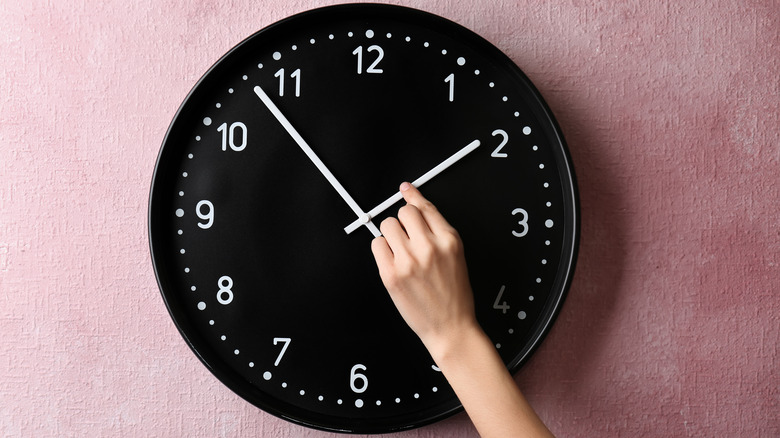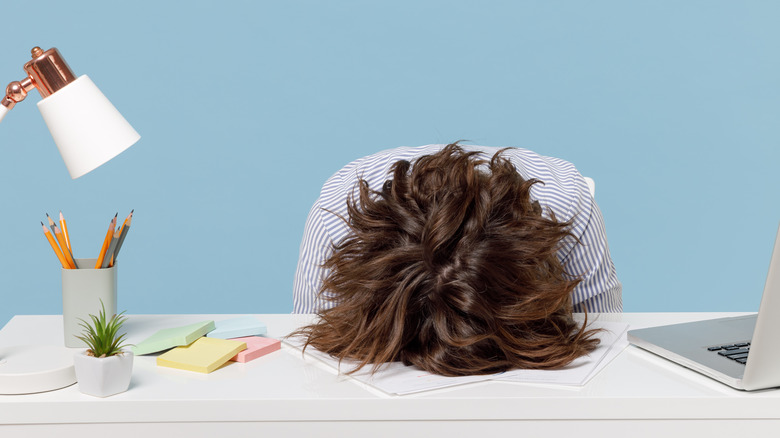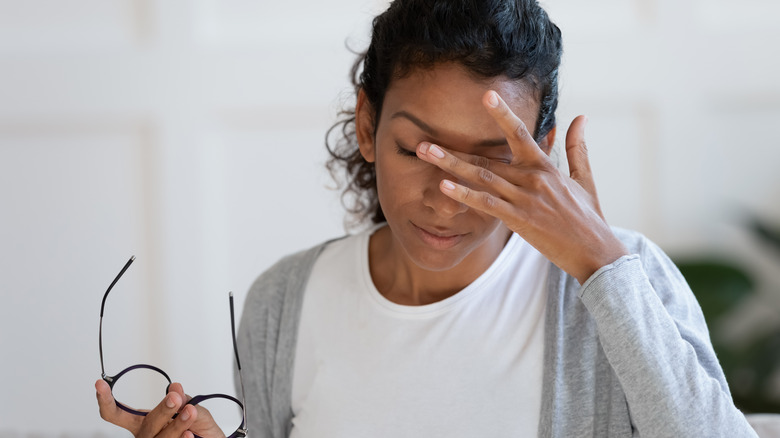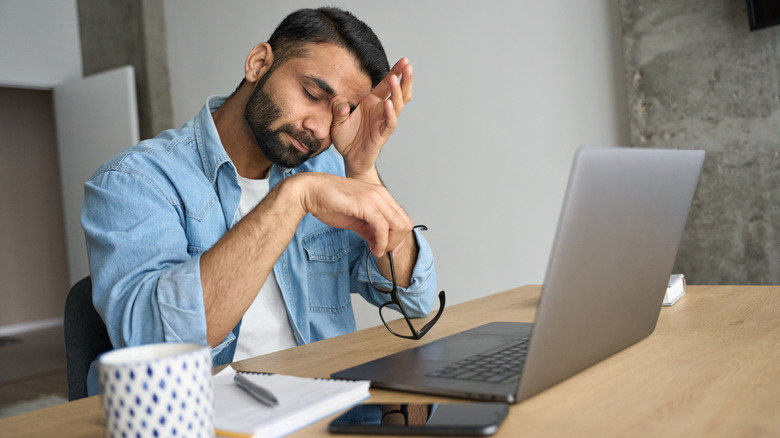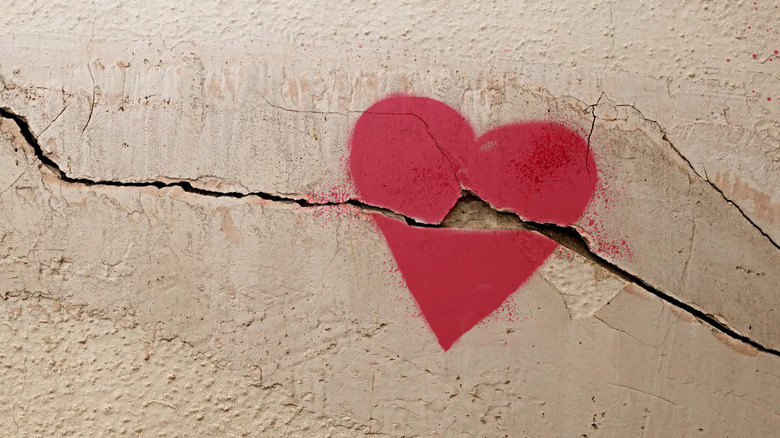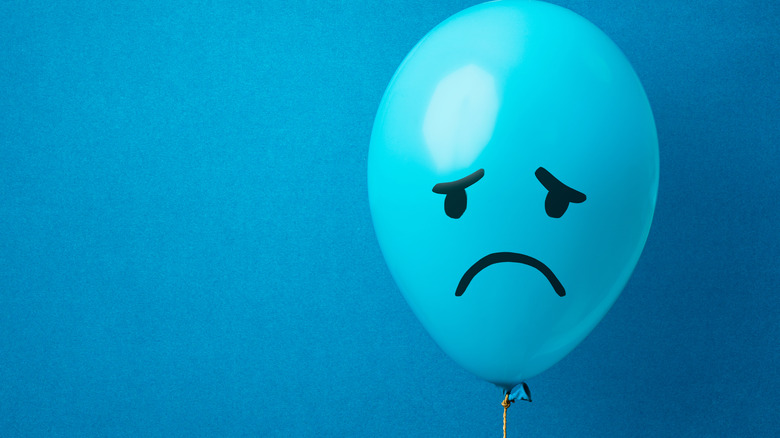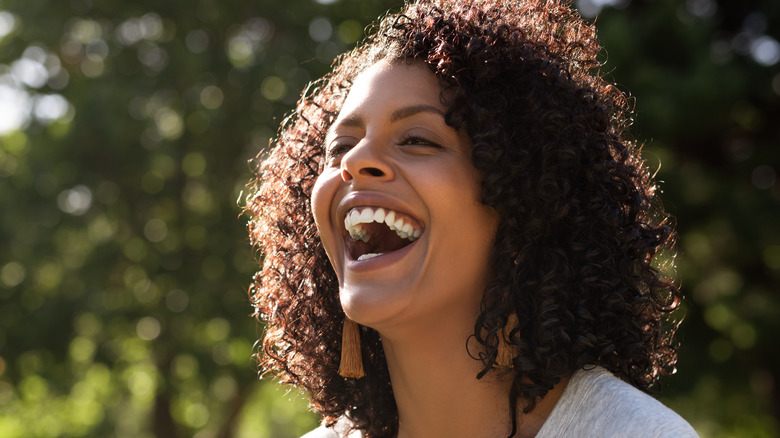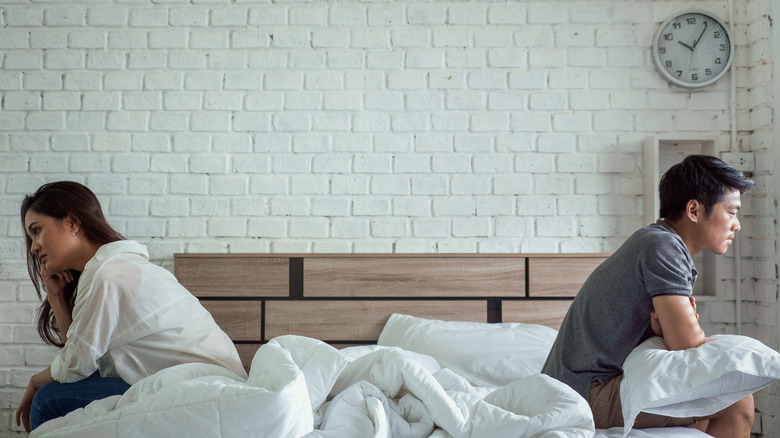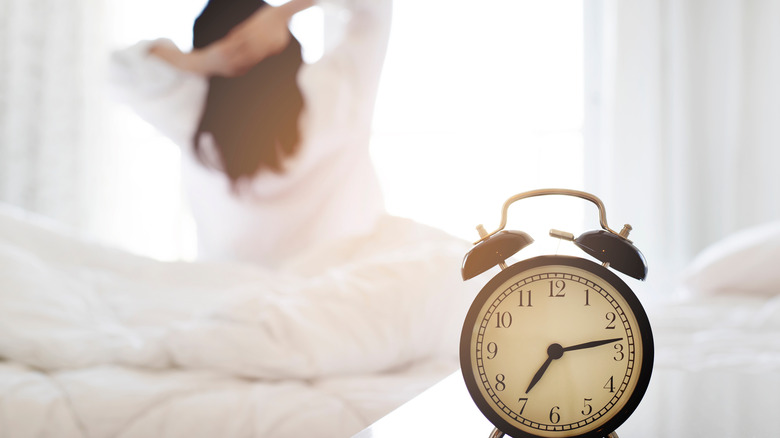What Happens To Your Body During Daylight Saving Time
For more than a century, Americans have been setting their clocks back in the fall and ahead in the spring to continue the ritual of daylight saving time (DST). According to National Geographic, a few people sparked the idea of DST for various reasons, like allowing for more daylight hours for hunting and saving money on artificial lighting costs.
Yet, we still use it today, despite it being hotly contested by many. Most of the people in opposition to changing the clocks are so because of DST's potential mental and physical side effects. In fact, governments worldwide are considering getting rid of daylight saving time altogether in favor of a daylight-night shift that works with our bodies' natural clocks (per Scientific American).
Neurology and pediatrics professor Beth Malow also tells Scientific American, "Some people definitely seem to be more vulnerable [to DST side effects]. As we get older, our circadian rhythm or just our ability to deal with sleep deprivation is affected. People with underlying conditions oftentimes struggle more." Here's a look at some of the ways you may be impacted when the clocks change in the fall or spring.
You may feel hungry
Daylight saving time begins in March in the United States, causing Americans to set their clocks forward, essentially losing one hour of sleep if they remain on their usual sleep-wake schedule. While that sleep pattern change seems minor, it actually can do a lot of negative things to our bodies, especially if we're used to getting a specific number of snoozing hours each night.
Hunger is one way "springing forward" might affect you, and it could all lead back to not getting enough sleep the night before. Nutrition expert Jay Cardiello explains to Eat This, Not That that leptin, a hormone that regulates your feelings of fullness, drops when your body doesn't get enough rest. The result is an increase in hunger, which may leave you eating more calories than you normally would or if you're stuck in the office until lunchtime, could cause your belly to grumble all morning long.
You'll probably feel groggy
One of the most common side effects of turning the clocks forward in March is the grogginess that comes from losing an hour of sleep. Unfortunately, the lost hour doesn't just end on Sunday morning after the time switch at 2 a.m. It could also continue affecting you for a day or two after that until your body adjusts. Some people even experience sleep problems during the November change back to standard time, simply because DST throws off their natural circadian rhythms (per Sleep Foundation).
Clinical professor of sleep medicine Dr. Shannon Sullivan tells the American Academy of Sleep Medicine that longer periods of darkness in the morning and sunlight in the evening during DST can be detrimental to our body's sleep cycle. "The time change causes misalignment between the body's daily rhythm and the clock, making it harder to fall asleep at night, disrupting sleep quality, and leading to sleep loss which can negatively impact health and safety," Sullivan explains.
To curb some of the sleepiness you might experience, UT Southwestern's Department of Neuroscience Chair Joseph S. Takahashi suggests maintaining a routine sleep schedule and going to bed and waking up a few minutes later each morning until you feel more adjusted. Also, getting more time out in the sun could put your body back on a better schedule (via UT Southwestern Medical Center).
You'll be reaching for your coffee
You're far from alone if you find yourself drinking more coffee than usual for the first couple of days after daylight saving time hits. In an article for Psychology Today, clinical psychologist John Cline wrote that it's common for people to reach for the coffee machine when they feel tired, mainly because the caffeine in coffee is a stimulant drug that really works to perk us up. We tend to associate the taste and smell of it with the alertness we feel when we drink it. So, as a DST pick-me-up, coffee can definitely do the job, even if only temporarily.
While your coffee might get you through the morning more willingly, Cline does warn that too much caffeine can negatively impact anxiety, sleep patterns, and muscle tension. However, staying within acceptable amounts is perfectly okay for most people. Doctor Joseph Krainin tells The Healthy that it boils down to being smart with your caffeine intake to make the most of it. "If you're dragging on the Monday after a time change, getting some caffeine can help combat mental fatigue," Krainin says. "Just remember that it takes 20 to 30 minutes for your body to absorb the caffeine from your GI tract." In other words, give your body some time to feel the caffeine's effects before downing another cup.
Headaches and migraines could come your way
Not getting enough sleep can make your whole body feel out of whack, even if you're only losing an hour of shut-eye. According to Medical News Today, not getting enough rapid eye movement (REM) sleep may contribute to more intense headaches, but losing sleep at any stage can also cause tension headaches and lead to lower pain tolerance, making headaches feel close to unbearable for some.
Armed with that information, it may not be surprising that DST could trigger headaches, too, when we lose an hour of sleep in the spring. According to psychiatrist Emad Estemalik, migraineurs may be even more susceptible to DST-related headaches. "A lot of migraine sufferers usually will have a little bit of sleep deprivation or their sleep is affected by this change, so they'll see an increase in headache frequency during that period," he tells WRAL. Estemalik suggests that people who get migraines learn their common triggers, like specific migraine-causing foods and activities, and try to avoid them as much as possible around the dates when the clocks switch.
It may affect your brainpower
People who live with Alzheimer's or Parkinson's disease dementia may find that DST exacerbates their usual symptoms, leading to even more pronounced cognitive or behavioral challenges. That's because people with dementia may also experience a phenomenon known as sundowning, during which they could become more tired and confused once the evening hours set in. The changes that come with DST may make this event even more difficult for them (per Alzheimer's Los Angeles).
However, experts also say that DST could affect anyone similarly, even those without dementia, and the effects on the brain could be long term. Vanderbilt University Medical Center sleep expert Beth Ann Malow tells VUMC Reporter, "It's not one hour twice a year. It's a misalignment of our biologic clocks for eight months of the year. When we talk about DST and the relationship to light we are talking about profound impacts on the biological clock, which is a structure rooted in the brain. It impacts brain functions such as sleep-wake patterns and daytime alertness." Malow adds that while some people can adapt well to the change, others may take weeks or months to adjust.
Kids might be more willing to exercise with longer sunlight hours
Daylight saving time shouldn't be thought of as all bad. Some scientific evidence shows that when the time changes in March, giving us more daylight hours, we could become more willing to exercise. Researchers looked into this in a 2014 review published in the International Journal of Behavioral Nutrition and Physical Activity. Interestingly, they coined DST as a "potential public health intervention" after observing the effects of more evening daylight on children's physical activity.
The researchers reviewed studies involving more than 23,000 children in multiple countries. They considered their physical activity levels before and after the time change, accounting for things that could affect results, like weather and geographic sunset times. For many children, the longer daylight hours led to a "small increase in daily activity." Additionally, days with earlier sunsets tended to relate to less time participating in physical activities.
Undoubtedly, getting more hours outdoors can be health-positive, especially for children. In addition to allowing for plenty of room to move through physical activity, it provides for unstructured play, which boosts social, emotional, cognitive, and sensory skills (via Sanford Health).
You have a higher risk of crashing your car
Sleepiness can impact the way you drive. The CDC compares the effects of tiredness on drivers as similar to the effects of alcohol on drivers. Fatigue can cause you to have delayed reaction times, experience tunnel vision, and even fall asleep behind the wheel.
The tiredness that comes with daylight saving time is partially to blame for a heightened risk of traffic accidents when the time changes, according to a 2020 scientific report published in Current Biology. The other DST-related cause is circadian rhythm misalignment. The study's authors analyzed data from more than 730,000 fatal motor vehicle accidents that occurred in the United States over 21 years. Evidence showed a "modestly increased" risk of fatal motor vehicle accidents in the five weekdays following DST's spring time change. The period leading up to the time change and the period after these first five days showed no remarkable uptick in fatal accidents.
It might affect your job performance
Do you feel sluggish at your job for the first few days after a spring or fall time change? Again, it could be because DST throws off your usual sleep schedule. And when that happens, your work could really suffer. The National Sleep Foundation states that sleep deprivation doesn't only make you drag your feet a little more, but it could also make you less creative, focused, and productive. Work requires a lot of focus from your brain, but your attention span simply becomes impaired when you haven't gotten enough shut-eye.
What's even scarier than having a less-than-ideal job performance your boss won't be happy with? Getting hurt on the job. It's another potential risk when you're overtired from losing sleep. HULT International Business School explains that being awake for 17 hours can have similar effects as two glasses of wine. Sleepiness makes it more challenging to assess risk, comprehend the environment, and solve problems, all of which could raise your risk of injuring yourself or someone else at work.
Daylight saving time could be harmful to your heart
In 2013, researchers conducted a study to learn more about what seemed like an increase in acute myocardial infarction (AMI) following springtime changes for DST. AMI is the official name of a heart attack, which causes heart tissue damage when the heart suddenly does not get enough blood flowing to it (per Healthline). The researchers found that on the Monday after DST begins, heart attack counts increased by 24%. Interestingly, on the Tuesday after DST's culminating time change in the fall, AMI incidences decreased by 21%.
Experts believe that the higher risk of heart attack after DST begins stems from losing sleep. Cardiologist and author of the study Amneet Sandhu tells Reuters that the results show just how sensitive our bodies can be to a slight tweak in our sleep schedules. "Our study suggests that sudden, even small changes in sleep could have detrimental effects," explains Sandhu. Sandhu suggests that hospitals prepare for DST-related surges by increasing staffing the day after the time change when AMI risk rises.
Stroke may be a side effect of DST
A stroke happens when something interferes with the brain's blood supply, causing brain damage or death. Some strokes are hemorrhagic, caused by a burst blood vessel in the brain, while others are ischemic, meaning that a blood clot or some other disturbance is causing a halted blood supply to the brain. Ischemic strokes account for as much as 87% of all strokes (via CDC).
Research presented at a 2016 meeting for the American Academy of Neurology examined the potential relationship between ischemic stroke and daylight saving time. Specifically, researchers sought to find a link between stroke and our interrupted circadian rhythm from DST. Results showed that in the two days following a daylight saving time change, the risk of ischemic stroke increased by 8%. Additionally, the study found that people with cancer and those over 65 years of age had an even higher-than-usual stroke risk of 25% and 20%, respectively.
You may feel more depressed during the fall back
When DST comes to an end in the fall, our days get shorter, and evening hours can seem to drag as we await warmer, springier days. It's not uncommon to feel kind of down during the fall and winter months, not just because the weather isn't as inviting in many places, but also because there is less sunlight to keep us perked up and our internal clocks in check.
Healthline explains that people can experience seasonal depression with the fall time change. Seasonal depression happens during specific times of the year and may hit people at different periods, but it's likelier to happen during fall and winter. During bouts of seasonal depression, you might feel less energized, have trouble concentrating, feel depressed, or lose interest in things you'd usually love doing. And guess what's the typical culprit of seasonal depression? That's right — our circadian rhythm, which gets thrown off when the clocks change. "Good functioning for health and mental health relies on a regulation of this process," explains clinical psychology professor Jane Timmons-Mitchell.
You could feel happier during the spring ahead
If the shorter days make you sad, don't fret. Soon, more hours of sunshine in the day should help you feel refreshed and happy again. When DST starts in the spring, it's usually right around the time when many areas of the United States also experience warmer weather, prettier days, freshly blooming flowers, and more active birds and wildlife — all of which can also boost our moods. Add in more sunshine, and you've got a recipe for happiness and health.
According to CNN, the sun is known for helping our bodies get the vitamin D it needs for immune health and melatonin our brains use to keep our internal clocks moving at a good pace. Clinical health psychologist Alicia Roth explains that your body suppresses melatonin when you're outside in the sun. When you're back inside, away from the sun, melatonin production increases, making you feel more tired.
As for your happiness, thank the sunlight's effect on serotonin, a hormone that balances mood. Research shows that being in sunlight increases this feel-good chemical naturally, and you'll get more time to relish the sun when DST begins (via Time).
It may throw off your relationship and sex drive
Not feeling as frisky as usual? As it happens, you might be able to blame that on daylight saving time, too. When clocks bounce ahead one hour in the spring, affecting your usual sleep pattern, other areas of your life can suffer. Behavioral expert Wendy Troxel tells Insider that many Americans already lack sleep when daylight saving time hits. DST only makes matters worse. "Your mood suffers, and you're more irritable and likely to take that out on your partner. And daylight saving time can exacerbate that," says Troxel.
A lower sex drive could also stem from sleep loss. Research finds that men are more likely to experience erectile function when they aren't getting enough sleep. Additionally, women tend to experience more sexual arousal when they get a good night's sleep, a 2015 study in the Journal of Sexual Medicine found.
Your body eventually adjusts
The good news is that for most people who get thrown off by daylight saving time changes, the after-effects are only temporary. Eventually, the body adjusts, although it could take longer for some people than others. Sometimes, taking steps to prevent a huge impact on your overall health and well-being can help. Sleep specialist Harneet Walia tells Cleveland Clinic that sticking to your daily routine and avoiding caffeine several hours before bed can help you stay on a good sleep schedule. If you need to nap, Walia recommends shorter naps no longer than 20 minutes, as they are much better than longer naps at keeping your biological clock in check.
The Old Farmer's Almanac also suggests getting as much daylight as you can. Go outside for a walk, get some fresh air after you wake up, and spend some time in the early evening outdoors to keep serotonin levels up and balance your circadian rhythm.

